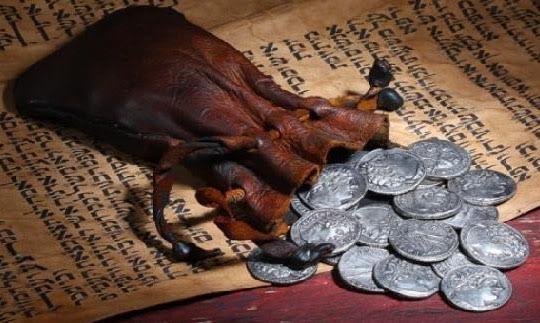Holy Wednesday - Money is a passport to every place except heaven and happiness.
The Servant of God Archbishop Fulton Sheen once said these words: "The tragedy of Judas' life is that he could have become a saint Judas."
Judas' question to the chief priests fills us with deep sadness. The story of moments spent together with Jesus, listening to his words and observing his gestures; the experience of all that cannot be conveyed by any content – what is lived in the depths of the heart – all this is reduced to one sad question: "What are you willing to give me if I hand him over to you?" (Mt 26:15).
The Pharisees promised Judas thirty shekels in silver. It was one hundred Attic drachmas or one hundred Roman denarii. This sum did not even match the price paid for a slave at that time (usually 500 drachmas, sometimes 250). Judas sold his Master cheaply. Judas is an example of a man who follows Jesus not to serve Him, but to gain ordinary benefit. When he realizes that the kingdom that Jesus proclaims will not benefit him materially and may even cost his own life, he decides to derive the greatest benefit.
A London newspaper once offered a prize for formulating the best definition of money. It was awarded to a young man who wrote: "Money is a passport to every place except heaven and happiness".
These 30 pieces of silver did not make Judas happy, but what could he buy with them? In Jesus' day, 30 pieces of silver could buy 200 liters of wine or 600 loaves of bread. When it comes to salaries – it was a two-month baker's salary or even a four-month salary of a person who dealt with cleaning. Judas, receiving his payment, could therefore have dealt with so much money for him for the first time in his life, and therefore, blinded by this mammon, he made a deal with the Jews.
We do not know the heart of Judas, his motives... We suppose that perhaps Jesus did not meet his messianic expectations, that it was supposed to be quite different. We also do not know whether in the face of his dilemmas he sought help in talking to his brothers, whether he opened up to them or rather remained alone. We also leave the eternal fate of the son of perdition to God's gaze. Today we want to learn a lesson for us from this scene of betrayal.
First, God is not there to meet our expectations. Yes, we are to entrust our lives to Him, we are to ask trustingly for our intentions. Above all, however, it is important that we constantly seek his will, that we fit into his plan.
Secondly, in a sense, selling our love for Jesus for modern silver always happens whenever Christ does not take the first place, when we "change into small things" our Christianity, allowing compromises and explaining that "it is not possible", that "the world has moved forward.
Thirdly, we must cultivate our human relationships, which God has given us. To guard fidelity and truth, to guard love and friendship. Feel the weight of the words spoken and the promises made. Talk in the face of difficulties, seek advice from good and wise people. We should not allow the clatter of silver to be heard under the roofs of our homes, for which we would be able to sacrifice our happiness.
Let us hold on to Christ by remaining in the Church. Let us be aware of our weakness and the opportunities that God's grace gives us. St. Philip Neri when he woke up always said: "Lord, hold your hand over Philip today, or Philip will betray you." I think it's a good plan for each of us to start every day.
Thoughts form Saint Faustina: Jesus said: O soul steeped in darkness, do not despair. All is not yet lost. Come and confide in your God, who is love and mercy.
- But the soul, deaf even to this appeal, wraps itself in darkness.
Jesus calls out again: My child, listen to the voice of your merciful Father.
- In the soul arises this reply: “For me there is no mercy,” and it falls into greater darkness, a despair which is a foretaste of hell and makes it unable to draw near God.
Jesus calls to the soul a third time, but the soul remains deaf and blind, hardened and despairing. Then the mercy of God begins to exert itself, and, without any co-operation from the soul, God grants it final grace. If this too is spurned, God will leave the soul in this self-chosen disposition for eternity. This grace emerges from the merciful Heart of Jesus and gives the soul a special light by means of which the soul begins to understand God's effort; but conversion depends on its own will. The soul knows that this, for her, is final grace and, should it show even a flicker of good will, the mercy of God will accomplish the rest. (Diary 1486)
fr. george


